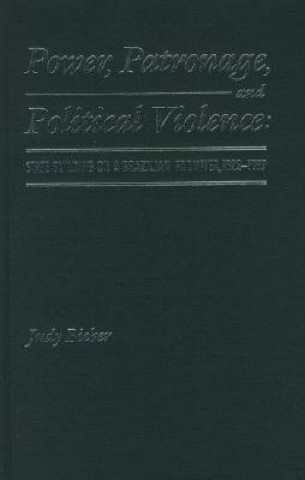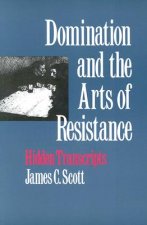
Code: 04922361
Power, Patronage, and Political Violence
by Judy Bieber
Judy Bieber explores the relationship between state centralization and municipal politics in Minas Gerais, Brazil, during the Imperial Period, 1822-89. She charts the nineteenth-century origins of coronelismo, a form of machine po ... more
- Language:
 English
English - Binding: Hardback
- Number of pages: 253
Publisher: University of Nebraska Press, 1999
- More about this

68.58 €
Availability:
50/50 We think title might be available. Upon your order we will do our best to get it within 6 weeks.
We think title might be available. Upon your order we will do our best to get it within 6 weeks.We search the world
You might also like
-

Tax Policy and the Economy
70.50 € -

Yeats and English Renaissance Literature
115.86 € -

Evolution of a Farming Community in the Upper Thames Valley
29.69 € -4 % -

Bridling of the Tongue and the Opening of the Mouth in Biblical Prophecy
302.13 € -

Salem's Daughter: The Haunting
13.02 € -23 % -

Death Throes of a Dynasty
56.36 € -

In Blood We Trust
12.52 € -5 %
Give this book as a present today
- Order book and choose Gift Order.
- We will send you book gift voucher at once. You can give it out to anyone.
- Book will be send to donee, nothing more to care about.
Availability alert
Enter your e-mail address and once book will be available,
we will send you a message. It's that simple.
More about Power, Patronage, and Political Violence
You get 172 loyalty points
 Book synopsis
Book synopsis
Judy Bieber explores the relationship between state centralization and municipal politics in Minas Gerais, Brazil, during the Imperial Period, 1822-89. She charts the nineteenth-century origins of coronelismo, a form of machine politics that linked rural power and patronage at the municipal level to state and federal politics. By highlighting the structural role of the municipality within the political system, Bieber provides a key to explaining Brazil's so-called exceptionalism - its ability to maintain territorial and political cohesion within the framework of a constitutional monarchy instead of fragmenting violently, as did many Spanish republics. Despite the maintenance of national unity, political violence characterized much of Brazil's political history, especially in the municipalities of its frontier regions. Historians have often attributed the chaotic nature of these politics to geographical isolation and decentralization of power. Bieber challenges these assumptions, arguing instead that state centralization was the primary factor contributing to political violence in Brazil's frontier regions. The Brazilian national government centralized appointments of municipal authorities, thereby linking partisan affiliation on the periphery with provincial and national political parties. Local appointees corrupted and abused the mechanisms of social control in order to attain electoral victories for political patrons who had rewarded them with official jobs. This system produced escalating violence and promoted judicial impunity at the municipal level while simultaneously creating political stability at the provincial and federal levels. National discourse attributed political violence to a natural tendency possessed by rural elites in the uncivilized backlands. Municipal actors, however, belied prevailing stereotypes of ideological passivity and intellectual backwardness. In the press and in private correspondence they actively sought to define the terms of their political participation, developing their own conceptions of liberalism and ethical norms of political patronage. Judy Bieber is an assistant professor of history at the University of New Mexico.
 Book details
Book details
Book category Books in English Society & social sciences Politics & government Political control & freedoms
68.58 €
- Full title: Power, Patronage, and Political Violence
- Subtitle: State Building on a Brazilian Frontier, 1822-1889
- Author: Judy Bieber
- Language:
 English
English - Binding: Hardback
- Number of pages: 253
- EAN: 9780803212978
- ID: 04922361
- Publisher: University of Nebraska Press
- Weight: 510 g
- Dimensions: 229 × 152 × 25 mm
- Date of publishing: 01. December 1999
Trending among others
-

The Gulag Archipelago
14.84 € -22 % -

Manufacturing Consent
13.32 € -28 % -

The Gulag Archipelago, 1918-1956
17.57 € -27 % -

Re-enchanting The World
17.16 € -18 % -

Media Control - Post-9/11 Edition
13.73 € -

Anatomy of the State
11.71 € -27 % -

Human Rights: A Very Short Introduction
8.88 € -28 % -

Propaganda
15.55 € -3 % -

In Order To Live
11.30 € -23 % -

International Law: A Very Short Introduction
9.28 € -28 % -

Red Horizons
15.65 € -26 % -

On Palestine
14.74 € -18 % -

Nothing To Envy
9.38 € -24 % -

The Gulag Archipelago, 1918-1956
18.58 € -22 % -

How Propaganda Works
19.99 € -17 % -

Suffragettes
3.42 € -17 % -

Summary of Propaganda by Edward Bernays
5.65 € -23 % -

Propaganda and the Public Mind
21.41 € -10 % -

So You Want to Talk About Race
14.84 € -26 % -

Citizenship
12.72 € -26 % -

Palestine in Israeli School Books
43.23 € -

Autobiography of Malcolm X
18.88 € -23 % -

Long Walk To Freedom
15.24 € -22 % -

Understanding Power
18.68 € -18 % -

Gift of Love
11.10 € -24 % -

Commissar Vanishes
36.36 € -4 % -

Gulag Archipelago
18.68 € -22 % -

On Liberty
11.10 € -22 % -

New Jim Crow
11.30 € -28 % -

Political Philosophy: A Very Short Introduction
8.98 € -27 % -

Cultural Cold War
19.39 € -22 % -

Inventing Human Rights
15.04 € -16 % -

The Net Delusion
11.30 € -28 % -

Creating Capabilities
20.50 € -11 % -

Half the Sky
13.63 € -21 % -

Parkland: Birth of a Movement
19.69 € -18 % -

Rights of Man
7.36 € -27 % -

I Have a Dream
15.55 € -14 % -

Universal Human Rights in Theory and Practice
37.97 € -

Legitimacy of International Human Rights Regimes
43.83 € -

New World of Indigenous Resistance
17.87 € -10 % -

Fear No Evil
17.16 € -18 % -

Handbook of Tyranny
31.41 € -9 % -

Domination and the Arts of Resistance
22.92 € -4 % -

Desert and the Sea
13.12 € -16 % -

In Harm's Way
61.81 € -

Zinnophobia
37.87 € -10 % -

Christianity and Human Rights
44.54 € -

Terrorism, Rights and the Rule of Law
56.56 €
Collection points Bratislava a 2642 dalších
Copyright ©2008-24 najlacnejsie-knihy.sk All rights reservedPrivacyCookies


 15549 collection points
15549 collection points Delivery 2.99 €
Delivery 2.99 € 02/210 210 99 (8-15.30h)
02/210 210 99 (8-15.30h)